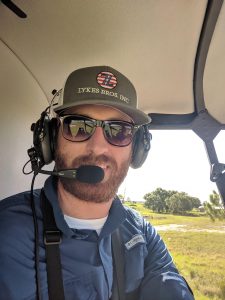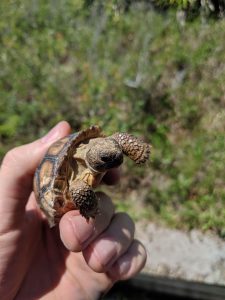University of Florida Wildlife Ecology and Conservation senior Nathaniel Owenby worked over the past summer at the Lykes Ranch in Okeechobee, Florida. Lykes Ranch is a large agricultural operation that spans about 340,000 acres over Glades and Highlands counties. The ranch includes cattle, forestry, sugar cane, and other landscape operations.
Owenby said he has had a passion and appreciation for animals and nature since he was young, but he had not thought about ecology until several years ago. “When looking for schools that gave degrees in the wildlife field I stumbled across UF, and after reading into their WEC program I knew it was what I wanted to do. I had no clue that I could get paid to ask these really fascinating, big questions. Since then, ecology has really interested me,” Owenby said.

Originally from North Carolina, Owenby heard about the Lykes Ranch internship at a meeting of The Wildlife Society Student Chapter. Every year, the wildlife biologists of Lykes Ranch come to the UF campus and give a presentation on the internship at a TWS meeting, where they also interview potential candidates.
The Internship
As an intern at Lykes Ranch, Owenby helped the staff wildlife biologist manage a variety of on-site operations, including gopher tortoise relocation, habitat management, managing white-tailed deer populations, and more.
“The great thing about the internship with Lykes Ranch is that almost every single day I had something different to do,” said Owenby. “Some days I would spend the entire day in the field, doing things such as building tortoise enclosures, while other days I would spend the day doing data entry.”
Owenby also said he participated in population management for the hunting leases on the ranch. “I was able to play a role in spotlight and aerial surveys of white-tailed deer, which were later used to calculate harvest recommendations for the ranch,” he explained. “I had never thought about that side of the field, so it was really eye-opening to see how useful ecology is in the world of wildlife management.”

One of the benefits of the experience was learning the core skills that one needs in the field of wildlife management, according to Owenby. He drove four-wheel drive trucks around the ranch, towed trailers, and operated tractors to cut firebreaks. Owenby also said he participated in some prescribed burning and used GIS maps when working within the field.
“I also got to see how the private sector operates when it comes to wildlife management. It was something that I had never really thought about, or been told how it functions. The big jobs that I had always heard about were through the government or non-profit organizations. So it was a really eye-opening experience for me,” he said.
One of the more memorable occurrences during the internship for Owenby was the annual alligator egg harvest that takes place at Lykes Ranch. He collected alligator eggs from nests spread out across the ranch. “It was incredible to learn the ins and outs of alligator farming,” Owenby commented. “However, it was also incredible to get the opportunity to be that close to these really iconic Florida reptiles. I got the chance to open alligator nests and hold the eggs while learning about their biology. I also had my fair share of run-ins with angry alligator females who were trying to protect their nests.”
Looking Forward
Next summer, Owenby would like to pursue some other internship opportunities. He said he is particularly interested in avian ecology and would like to do research in the future, as well as potentially pursue academia. He is currently in the beginning stages of a project that is looking at avian wintering migrants and how they use forest fragments while moving through an urban matrix.
 0
0
